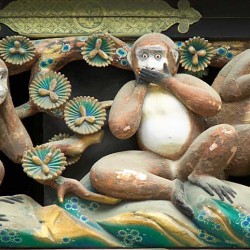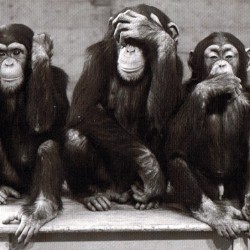Wise monkeys
02.25.2016The origin of the three wise monkeys (“see no evil, hear no evil, speak no evil”) is lost in the mists of time. They are so universal that they have their own emoji effigies, a sort of terrestrial consecration. But does the celestial meaning of their silent senses still mean anything to us now?
The symbolic wisdom of these monkeys predates its physical representation. It originated in China, and then found its allegory in Japan where it transcended the centuries. The first expression of this prescription is said to come from the Chinese sage Confucius (551-479 BC) or one of his disciples: “Look not at what is contrary to propriety; listen not to what is contrary to propriety; speak not what is contrary to propriety; make no movement which is contrary to propriety.” (The Analects, Book XII). This ancient oriental precept is said to have found its animal personification in Japan thanks to the phonetic identity of saru (猿) which means monkey but which is pronounced zarou, and indicates a negative form: thus the three monkeys are called Mizaru, Kikazaru and Iwazaru (Miza, Kika and Iwa are abbreviations for seeing, hearing and speaking) and are associated with the negative commands they represent: do not see, do not hear and do not speak.
It is very likely that the ancient sages of China and Japan wanted to signify that paying attention to improper things meant corrupting ourselves: by sullying our eyes, our ears or our words with any sort of filth we would become soiled, even if our intention was to protect ourselves from it. Evil proceeds by contagion, mimicry, it stains. So we must endeavour to fill our senses only with that which is just.
This idea has been transposed into western thinking by this maxim from the philosopher Friedrich Nietzsche (1844-1900), taken from his work Die fröhliche Wissenschaft (The Gay Science): “[…] I do not want to wage war against ugliness. I do not want to accuse, I do not want even to accuse the accusers. Looking aside, let that be my sole negation! And all in all, to sum up, I wish to be at any time hereafter only a yes-sayer!”
- Ignorance = fear, silence = death, 1989 (Keith Haring, 1958-1990)






